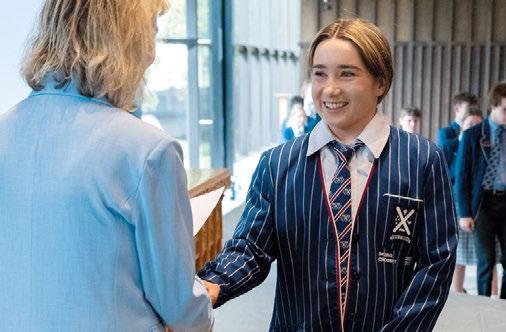
3 minute read
On the frontier of science
These former Science students from St Andrew’s College are forging exciting study and career paths in the field.

Dr Theresa Pankhurst (OC 2011) Dr Theresa Pankhurst’s journey through scientific research has taken interesting turns as a result of the COVID-19 pandemic. After leaving St Andrew’s, she studied Biomedical Science at Victoria University of Wellington, followed by a Master of Clinical Immunology. In 2021 she graduated with a PhD in Biomedical Science, researching adjuvants – a vaccine additive that makes vaccines more effective, that could be added to vaccines delivered via the nose as a nasal spray. In 2020, she joined the Vaccine Alliance Aotearoa New Zealand (VAANZ) Ohu Kaupare Huaketo at the Malaghan Institute of Medical Research (MIMR) to work with other leading scientists on New Zealand’s response to the COVID-19 pandemic. As a Postdoctoral Research Fellow at MIMR, she is now investigating next generation COVID-19 vaccines that aim to strengthen Aotearoa’s preparedness for the ongoing and future pandemics. She is also organising an overseas Postdoctoral secondment for 2023, with opportunities available for her to work in the UK and USA. Throughout Theresa’s scientific journey she has kept in touch with two of her St Andrew’s Science teachers, Brent Cummack and Kate Shelton. “They uncovered and cultivated my passion for science, and I will always be grateful for their role in kick-starting my scientific career.”

Ellena Black (OC 2016)
Ellena Black says the support of the St Andrew’s Science Department has helped her to achieve impressive results in her tertiary studies. “The support I had at St Andrew’s to extend myself, train for the Chemistry Olympiad in Tbilisi, Georgia, which was an absolute highlight, and do the Mathematics STAR course at the University of Canterbury, prepared me to finish my Bachelor of Science at the University of Auckland in just two years. I then did a year of Honours in Applied Mathematics before moving to Australia for my PhD in Quantum Chemistry at the University of Sydney.” Her PhD project involves using mathematical methods to improve algorithms that model chemistry computationally.
Ellena has been fascinated by Science and Mathematics from a young age. “I was lucky to be part of the first year of Accelerated Science at St Andrew’s, doing NCEA Level 1 Science in Year 10 and continuing in Physics, Chemistry and Calculus a year ahead from there. I am forever grateful for the support and advocacy of Mr Cummack and Mr French, who created a whole new class for us in Year 13, to extend our learning in the Sciences.”
Following her PhD, Ellena hopes to continue working in academia, both lecturing and researching.

Toby Bourke (OC 2017)
After completing a Bachelor of Engineering with Honours in Mechatronics Engineering at the University of Canterbury, Toby Bourke has been awarded a PhD Scholarship and stipend by the university. Toby’s PhD studies will investigate the development of a robotic platform capable of harvesting scallops for NIWA. The purpose is to find an alternative to current methods of scallop harvesting, which destroy the environment through dredging.
Toby studied Physics at St Andrew’s, and says his interest isn’t in Science itself, but its practical implementation. “This is why I studied Engineering, as I wanted to use the Science I have learnt to make something new. Doing Physics and Mathematics helped me towards studying Engineering, as these subjects allowed me to explore how I could design something to physically work.” Toby says former Head of Innovation and Information, Wilj Dekkers, helped him to explore his interest in Robotics when he took over the Vex Robotics Club, and Head of Science, Brent Cummack, helped him to explore his interest of using Science to implement physical systems. After completing his PhD, Toby plans to work either in Aerospace (the space industry) or in a field that focuses on robotics.










